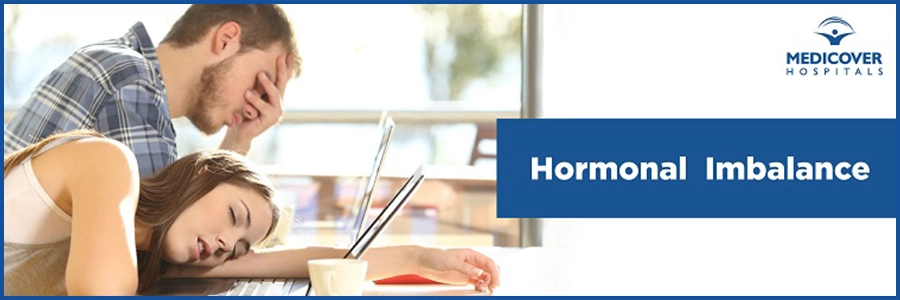- Cardiology 84
- Dermatology 45
- Endocrinology 33
- ENT 16
- Fertility 190
- Gastroenterology 78
- General-Medicine 81
- Gynecology 80
- Hematology 19
- Infectious-Diseases 33
- Neurology 52
- Oncology 34
- Ophthalmology 23
- Orthopedics 69
- Pediatrics 31
- Procedure 23
- Public-Health 144
- Pulmonology 59
- Radiology 8
- Urology 68
- Wellness 161
- Woman-and-child 77

Understanding The Hormonal Imbalance in Women: Symptoms, Causes & Treatment.
Hormonal imbalance in women can manifest through various symptoms, affecting their overall health and well-being. It's essential to recognize these signs early on to seek appropriate treatment. Here’s a comprehensive guide to understanding hormonal imbalance in women, covering symptoms, causes, and treatment options.
Common Symptoms of Hormonal Imbalance in Women
- Irregular Periods: One of the most common signs of hormonal imbalance is irregular menstrual cycles. This includes heavy bleeding, missed periods, or spotting between cycles.
- Weight Gain: Unexplained weight gain, especially around the abdomen, can be a sign of hormonal imbalance.
- Mood Swings and Depression: Hormones play a significant role in mood regulation. Imbalances can lead to mood swings, anxiety, and depression.
- Fatigue: Persistent fatigue or low energy levels, even with adequate rest, may indicate a hormonal issue.
- Skin Problems: Acne, dry skin, and other skin issues can be related to hormonal imbalances.
- Hair Loss or Excess Hair Growth: Changes in hair growth, such as thinning hair or increased facial hair, can be symptoms of hormonal changes.
- Sleep Problems: Insomnia or poor sleep quality may be linked to hormonal imbalances.
- Hot Flashes and Night Sweats: Common during menopause, these can also occur due to other hormonal issues.
- Reduced Libido: A decrease in sexual desire can be related to hormonal changes.
- Breast Tenderness: Hormonal fluctuations can cause breasts to become tender or swollen.
Causes of Hormonal Imbalance in Women
Hormonal imbalance in women can be caused by a variety of factors, including:
Stress
Chronic stress can disrupt the delicate balance of hormones in the body, leading to issues like irregular menstrual cycles, mood swings, and fatigue.
Dietary Factors
An unhealthy diet lacking in essential nutrients or high in processed foods can contribute to hormonal imbalances. Nutrient deficiencies and blood sugar fluctuations can throw off the body's hormonal regulation.
Medications
Certain medications, such as birth control pills, antidepressants, and hormone replacement therapies, can affect hormone levels if not adequately monitored and managed.
Underlying Medical Conditions
Conditions like polycystic ovarian syndrome (PCOS), thyroid disorders, and adrenal gland issues can disrupt the delicate hormonal balance in the body.
Lifestyle Factors
Things like lack of sleep, excessive exercise, and exposure to environmental toxins can all contribute to hormonal imbalances in women.
Hormonal Imbalance in Women's Treatment
Treating hormonal imbalances in women often involves a multi-faceted approach, including:
Dietary Changes
Adopting a nutrient-rich, whole foods-based diet can help restore hormonal balance. This may include increasing the intake of healthy fats, complex carbohydrates, and antioxidant-rich fruits and vegetables.
Stress Management
Incorporating stress-reducing techniques like meditation, yoga, and deep breathing can help regulate hormone levels.
Supplements
Certain supplements, such as omega-3 fatty acids, vitamin D, and herbal remedies, may help support hormonal balance when used under the guidance of a healthcare professional.
Medication Management
In some cases, prescription medications or hormone replacement therapy may be necessary to address severe hormonal imbalances. A healthcare provider should closely monitor this.
Lifestyle Modifications
Making changes to sleep habits, exercise routines, and exposure to environmental toxins can also play a role in restoring hormonal balance.
Conclusion
Hormonal imbalances in women can be caused by a variety of factors, from stress and diet to underlying medical conditions and lifestyle choices. Addressing the root causes through a combination of dietary changes, stress management, and other targeted interventions can help restore hormonal balance and improve overall health and well-being. It's essential to work closely with a healthcare provider to develop a personalized treatment plan that meets your individual needs.
Ready to take control of your health journey? Book your appointment now and start your path towards wellness today!
Book an AppointmentFrequently Asked Questions
Symptoms of hormone imbalance in women include bloating, fatigue, irritability, hair loss, palpitations, mood swings, blood sugar problems, difficulty concentrating, and infertility. These compounds impact every cell and system in the body, making hormone imbalance potentially crippling.
The most common causes of hormonal imbalances include thyroid problems, stress, and eating disorders.Symptoms include irregular periods, low sex drive, unexplained weight gain, and mood swings. Hormones, produced by the endocrine system, act as messengers in the body.
Foods high in saturated and hydrogenated fats, such as red meat and processed meat, can increase estrogen production and worsen symptoms of hormonal imbalance. Instead, it is recommended to consume eggs and fatty fish.
High-intensity exercises with little rest time in between, such as squats, lunges, pull-ups, crunches, and pushups, are ideal. The higher the intensity of a workout, the more hormones are released. Consistency is key to maintaining a steady flow of healthy hormones throughout the body.
You might notice changes in your body and mood. A doctor can do tests to check your hormone levels.
Yes, it can cause your periods to be irregular, too heavy, or too light.
Yes, it can affect your ability to conceive by disrupting ovulation and other processes needed for pregnancy.

- Cardiology 2132
- Dermatology 168
- Endocrinology 135
- ENT 97
- Fertility 217
- Gastroenterology 232
- General 478
- General-Medicine 1685
- Gynecology 169
- Hematology 85
- Infectious-Diseases 208
- Neurology 207
- Oncology 345
- Ophthalmology 65
- Orthopedics 187
- Pediatrics 83
- Procedure 72
- Public-Health 209
- Pulmonology 126
- Radiology 13
- Second Opinion 311
- Urology 294
- Wellness 600
- Woman-and-child 447
- Others 10217
Related Blogs
If you have any questions, please fill out the enquiry form or call us, and we will get back to you promptly.
040-68334455